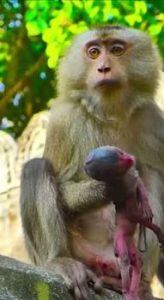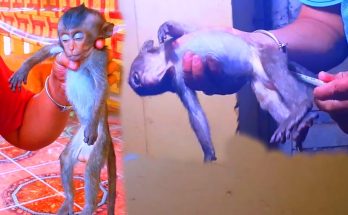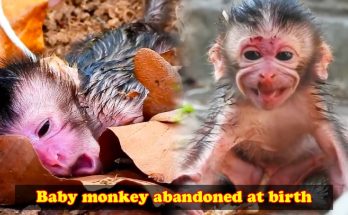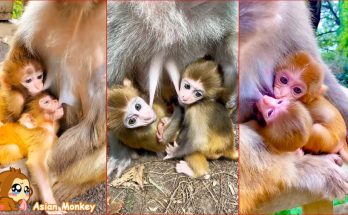
The animal kingdom is full of emotions, instincts, and bonds that often mirror those of humans. Among them, monkeys are some of the most intelligent and emotionally complex creatures. They live in social groups, form deep connections with one another, and, just like humans, can experience the pain of loss.
Lori, a mother monkey, recently experienced a devastating event—her attempt to give birth was unsuccessful. The loss of her baby has left her visibly sad, and those who know her can see the pain in her eyes and behavior. This heartbreaking moment serves as a reminder that animals, too, feel grief and loss in profound ways.
The Maternal Bond in Monkeys
Motherhood in monkeys is deeply ingrained in their nature. From the moment a female becomes pregnant, she begins to exhibit nurturing behaviors. Monkeys have strong maternal instincts, and their connection with their offspring is crucial for the baby’s survival. In the wild or in captivity, a mother monkey will carry, nurse, and protect her young with dedication.
The maternal bond is not just about protection; it’s also emotional. Scientists and animal behaviorists have observed that mother monkeys express affection by grooming, cradling, and even talking to their babies in soft vocalizations. This bond begins before birth, making the loss of a baby particularly devastating for the mother.
For Lori, the experience of carrying her baby inside her, feeling its movements, and preparing for its arrival must have created a deep attachment. When her birth was unsuccessful, that connection was tragically severed, leaving her confused, heartbroken, and grieving.
Signs of Grief in Monkeys
Many people assume that grief is a human experience, but studies have shown that animals, particularly primates, experience mourning and emotional distress. When monkeys lose a baby, they often show visible signs of sadness.
Lori’s behavior may have changed drastically since the loss. Some common signs of grief in monkeys include:
Withdrawal from the group: A grieving mother monkey may isolate herself, refusing to interact with other members of her troop. If Lori is in a social setting, she might avoid others and prefer to be alone.
Loss of appetite: Sadness can cause physical symptoms, including a lack of interest in food. If Lori is eating less or ignoring her favorite treats, it’s a clear indication of her emotional state.
Carrying the lost baby: Some mother monkeys continue to carry their deceased infants for hours or even days, unable to let go. This behavior has been observed in many primate species and is thought to be part of the mourning process.
Crying or vocalizing: Monkeys have specific calls for distress and sadness. Lori might be making soft, sorrowful sounds, a way of expressing her grief.
Lack of energy and enthusiasm: Monkeys are normally active, playful animals. If Lori has become lethargic, spending more time sitting quietly, it’s another sign that she is grieving.
These behaviors are heartbreaking to witness, but they also prove that animals experience deep emotions.
How Monkeys Cope with Loss
Monkeys, like humans, have ways of coping with loss. They rely on their social groups for comfort and support. In a natural setting, other monkeys may come close to Lori, offering gentle touches or grooming her as a way of providing emotional support. Grooming is an important bonding activity in monkey communities, and it can help relieve stress and sadness.
If Lori is in a zoo or sanctuary, caretakers can help her by:
Providing extra attention and care: Caregivers can spend more time with her, observing her behavior, and making sure she eats and stays healthy.
Encouraging social interaction: If Lori has friends within her group, encouraging her to spend time with them can help her recover emotionally.
Offering enrichment activities: Engaging Lori in activities such as puzzle feeders, climbing challenges, or toys can serve as a distraction and help lift her spirits.
Some monkeys recover from loss faster than others. With time, support, and the presence of her group, Lori may slowly begin to heal.
Animal Grief: A Deeper Look
Lori’s grief is not unique. Many animals mourn their dead, showing behaviors that resemble human mourning rituals. Elephants, for example, have been known to visit the bones of deceased family members, touching them gently with their trunks. Dolphins have been observed carrying their dead calves, much like monkeys do. Even dogs and cats show signs of depression when they lose a companion.
Scientists believe that grief serves an evolutionary purpose. In social animals, strong emotional bonds help maintain group stability and cooperation. When a member of the group dies, the sadness experienced by others is a sign of those deep connections.
For mother monkeys like Lori, the loss of a baby is especially painful because reproduction is central to survival. A mother invests months carrying her baby, and losing it can be both emotionally and physically exhausting.
Moving Forward
Though Lori’s sadness is heartbreaking, there is hope for her recovery. The pain of loss never fully disappears, but animals, like humans, learn to adapt. Over time, she may begin to show interest in food again, interact more with her group, and find comfort in her daily activities.
If Lori is part of a captive environment, caregivers will continue monitoring her to ensure she does not fall into deep depression. If she is in the wild, her social group will likely play a vital role in helping her heal.
Her experience reminds us of the emotional lives of animals and their ability to love, grieve, and heal. While we may not fully understand everything they feel, we can recognize their pain and show empathy for their loss.
Lori’s story is a testament to the depth of emotions found in the animal world. Though she has suffered a great loss, time, care, and the support of her fellow monkeys may help her find happiness again. Until then, those who care for her will watch over her, hoping to see her spirit return in the days to come.


